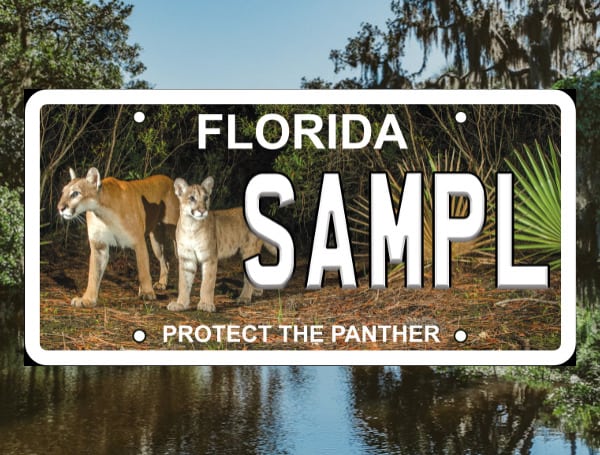The Protect the Panther License Plate will soon have a new design featuring a stunning photograph taken by photographer Carlton Ward in 2018 of a now-famous female and her kitten.
The adult female panther pictured on the plate is well known because she is the first female documented north of the Caloosahatchee River since 1973. She is also the first female documented to have had kittens north of the river in more than 40 years.
For many years, the Caloosahatchee River appeared to be a major obstacle to the northward movement of female panthers and the natural expansion of the population.
In the news: Vehicle Collisions Still Primary Cause Of Death For Florida Panthers
The Florida Fish and Wildlife Conservation Commission (FWC) worked with photographer Carlton Ward and the Fish & Wildlife Foundation of Florida to design the new plate, which is currently being finalized.
Once vetted by the Florida Highway Patrol, the plate should be available later this year for purchase by visiting the Florida Department of Highway Safety and Motor Vehicles or your local tax collector’s office.
The Protect the Panther license plate fees go directly into the Florida Panther Research and Management Trust Fund. The trust fund is the key funding source for the state’s panther-related research, rescue and conservation activities.
Through the long-term public support of the trust fund, critical information gained from the FWC’s monitoring and research efforts continues to provide biologists and the public with timely, science-based information needed to guide current and future conservation actions.
Through effective research and management, the FWC and conservation partners have made significant progress toward recovery of the endangered Florida panther. Over the past three decades, the trust fund has paid almost entirely for all aspects of the FWC’s panther work, and the program relies upon sales of the license plate to continue these conservation efforts.
In the news: Researchers In Florida Complete Health Assessment On Florida Panther Litter
Florida panthers are native to Florida, and most are found south of Lake Okeechobee. Panthers are listed as an Endangered Species under the federal Endangered Species Act, and it is illegal to harm or harass them in any way. There are approximately 120-230 adult panthers in the population.
In addition to purchasing a Protect the Panther License Plate, motorists can help by observing all posted speed limits, especially in panther zones, which are in place in several counties across South Florida and coincide with areas where panthers are known to cross. These panther speed zones help ensure the survival of the endangered Florida panther and protect motorists from personal injury.
Android Users, Click To Download The Free Press App And Never Miss A Story. Follow Us On Facebook and Twitter. Signup for our free newsletter.
We can’t do this without your help; visit our GiveSendGo page and donate any dollar amount; every penny helps.

